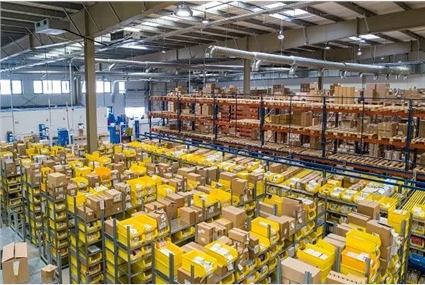Blog
Back
Transforming Your Warehouse Into an Advanced One
As we get further into the 21st century, it’s becoming ever harder to keep up with the incredible pace of technology. It has taken deep roots in all aspects of our lives and businesses. Today, many companies all around the world use advanced warehouse management systems (WMS) to track, organize and manage their warehouse activities.
Most companies require an efficient warehouse and distribution hub, but they can only attain that through a powerful tool able to optimize packing, storage, and distribution. If you’re among those companies that still have not upgraded their warehouse, then this article is for you. Here, we’ll take a look at different types of advanced warehouse management systems and their benefits.
ِDifferent Types of Warehouse Management Systems
Companies generally select a system based on their size and whether they need to control inventory during the supply chain process. If none suit the business’s needs, a tailored system in line with its operation is required.
Standalone Systems
This is the most basic system consisting only of warehouse management functions. But, it can also include supply chain features. It’s primarily suitable for small companies that have dedicated a limited budget for software.
Supply Chain Modules
Warehouse management is only one of the many features included in supply chain modules. Companies utilize this module to monitor inventory during the supply chain process. They also deploy it to manage supplier and vendor relationships. Among the most prominent benefits of these modules is their ability to be easily integrated with other systems.
Enterprise Resource Planning (ERP)
Among the most well-known and popular systems to set up advanced warehouses is Enterprise Resource Planning (ERP). ERP systems offer significant benefits in terms of inventory and warehouse management. For instance, companies can observe the volume and frequency of sales across all product categories and adjust their production accordingly. Furthermore, they can use the data to predict customer purchase behavior.
Benefits of a Warehouse Management System
Utilizing the right warehouse management system can provide substantial benefits for a company, including the following.
- Optimal Outbound & Inbound Processes
The inbound process means that companies track and record receipts of goods at their warehouse. During such a process, the staff monitors factors such as quantity and identity while documenting previous steps. The WMS holds real-time records of all goods from the moment they enter the warehouse, streamlining the intake process. Plus, the system will analyze the square footage of the warehouse, enabling employees to detect free spaces.
On the other hand, the WMS will track all the goods as they’re loaded and shipped throughout order preparation and fulfillment. This is called an outbound process where companies employ an advanced warehouse management system to detect and ship goods to customers.
- Labor Productivity & Efficiency Boost
In addition to optimized inventory tracking, a WMS can better assign each task to the right staff, significantly enhancing productivity and lowering operating expenses. By considering each employee’s skills, proximity, and access to equipment, the WMS can pick the right staff member for each job. By doing so, the amount of travel time in the warehouse is significantly reduced, leading to more efficient labor utilization.
The system can assign daily tasks based on worker profiles and continuously monitor item movements to prevent double checks, reduce mis-picks and streamline the order fulfillment process.
- Lowering Expenses
As stated before, warehouse management systems optimize space utilization by analyzing each task and the materials involved. By conducting a comprehensive audit over the space and floor plan, the likelihood of wasting floor space and time will significantly drop. In addition, the costs associated with excessive movement, incorrect item placement, and lengthy retrieval will decrease. These factors significantly contribute to lowering the overall expenses of a company.
- Improved Customer Relationships
As advanced management systems sort through and pick products effectively, executives now have more freedom of choice to manage order fulfillment in such a manner that greatly eliminates any hang-ups or problems associated with traffic and congestion.
Naturally, order cycle time drops, and customer satisfaction enhances. With continuous order tracking and monitoring, customers will receive immediate shipment notifications revealing when and how their order will be delivered.
- Internal Automation
By utilizing advanced warehouse management systems, internal tasks are automatically assigned, and all activity recordings will transition from a paper format into a digital one. Doing so will significantly improve operational scalability and information accuracy.
Thanks to consistent updates within such systems, new features will be available compatible with best practices, helping companies keep up with the latest developments and utilize these innovations to improve their processes.
- Enhanced Security
In most cases, employees need their own user accounts to enter transactions onto a warehouse management system. By doing so, managers can connect each transaction to a staff member, improving accountability and preventing theft and similar issues. In addition, they can use honest mistakes as an opportunity to train employees on utilizing the system.
Moreover, since each user group is granted a particular access level, there won’t be any issues regarding unauthorized access to reports, eliminating concerns regarding leaking trade secrets and losing competitive advantage.
Bottom Line
In this article, we endeavored to provide you with a glimpse of advanced warehouse management. We hope this guide contained sufficient information about the importance of warehouse management systems. An optimally designed warehouse management system is the best tool to improve your chances of success/profitability while ensuring maximum security.
Of course, considering the wide range of available systems out there, it may be a bit overwhelming to narrow down your search to the perfect tool. Some solutions on the market follow a “one-size-fits-all” approach, which may go against the nature of your work. The ideal solution is an adjustable system that accommodates your operational needs and limitations. Fortunately, IMTS’s ERP solution is precisely such a system proffering all of the above benefits. To find out more about our services and products, please contact us.